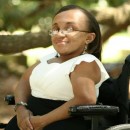- A
- A
- A

One of the things I wish to see more of in the disabled community is us knowing how to be effective in demonstrating solidarity to marginalized groups when tragic circumstances occur. Recently, the climate has been emotionally charging for Black disabled advocates who witnessed the acquittal of the Philando Castile trial and the killing of Charleena Lyles in Seattle. Both of these events happened within days of each other, and many of us were at our full emotional capacity from the outcomes learned of.
An observation I have made is the disabled community’s inability to show support for groups who may be experiencing injustices and acknowledge how members of those groups in our community may be affected. This is particularly so when violence and discrimination transpires against disabled people of color.
Regarding the aforementioned incidences, I saw two things occur: the same non-Black allies who showed support and outrage over the outcomes and the same non-Black allies who took up space by capitalizing on the pains of what happened. Whenever these situations come about, it is always the same voices and faces either supporting or exploiting, and that has to change.
Our community harps on the concept that other marginalized communities should back our work, issues, and be better allies. We cannot expect such things if we steadily are unable to reciprocate these efforts. Building solidarity is not and cannot be deem as a one way street – it must exist and be enacted by all parties involved.
Furthermore, it should be a priority to strengthen our solidarity muscle since our community is unique in the fact that anyone can become a member of it throughout the lifespan. When we fail to support other marginalized groups, we are forgetting that we have members in our community who belong to those same groups. When we do not emphasize uplifting our own members, how can we be trusted to be considered as good allies to the groups they represent outside of disability?
I hope that we step up and do the work that is needed to become the allies we wish to have. In the climate we live in, this is critical and should not be dismissed. As someone who is multiply-marginalized, it disheartens me that we have not gotten this right. I want to see disability organizations recognize when traumas and assaults occur on multiply-marginalized members and it not fall on the backs of grassroots advocates to do this work. I want to see more of our leaders stand together with communities when justice has not been served and express rightful outrage.
When injustices harm one group, we should all rise up and proclaim that such wrongs will not be accepted in our society. It should not be the burden of the people in that group to shoulder the outcries about wrongdoings, and yet in most cases, this burden falls on them.
I want our community to do a self-inventory as to how we can be held more accountable, and strategize how to be in solidarity with others groups. Now is the time to get it right – no more stalling, no more excuses.